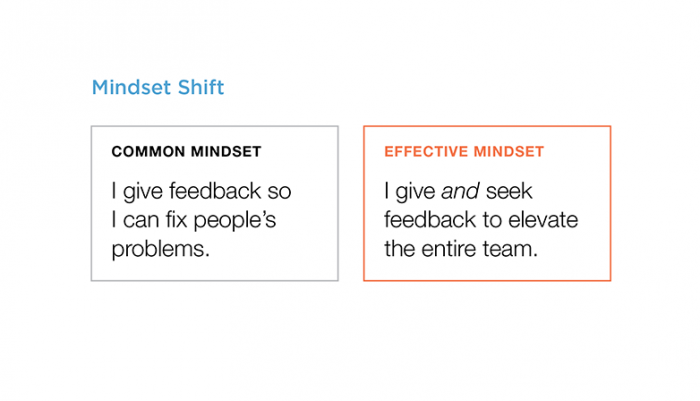Pratiqu 4: Créer une culture du feedback

Équilibrer le courage et la considération.
Lorsqu’il s’agit de donner un feedback, il y a deux extrêmes :
- Trop de courage. Ce type de manager n’a aucun problème à dire à tout le monde ce qu’il pense. Il donne souvent trop de feedback, trop sévèrement et trop souvent.
- Trop de considération. Pour cet autre type de manager, l’idée de donner à quelqu’un un feedback sévère lui inspire de la peur. Il l’évite donc complètement et les problèmes non seulement persistent, mais s’aggravent.
Les deux extrêmes du spectre ne rendent pas service à leurs équipes. Trop de courage et pas assez de considération peuvent détruire l’estime de soi ou la confiance. Mais il est tout aussi dommageable d’avoir trop de considération et pas assez de courage, lorsque le manager abandonne involontairement son équipe. En ne donnant aucun feedback ou en restant trop vague, il renforce les faiblesses de ses collaborateurs. Les membres de l’équipe continuent de tomber dans les mêmes pièges qui entravent leurs performances et leur développement.
Le fait de ne pas donner de feedback nuit également à la perception qu’ont les membres de l’équipe du manager. S’il semble ignorer une question difficile, l’équipe peut considérer qu’il est faible et perdre confiance en ses capacités.
Clarifier ses intentions
Le feedback est une question de motivation. L’équipe doit savoir et croire que l’intention de son manager est de l’aider à développer ses compétences et ses talents.

Feedback Effectif
L’état d’esprit du leader inefficace consiste à se considérer comme le “réparateur” : son équipe a des problèmes, et il pense donc qu’il est de son devoir de signaler ce que l’équipe fait mal par le biais d’un feedback. En revanche, l’état d’esprit efficace consiste à libérer le potentiel des autres, y compris celui du manager lui-même, lorsqu’il demande un feedback.
Les gens considèrent le feedback différemment en fonction de leurs expériences individuelles, mais certains principes universels s’appliquent à presque tout le monde. Le feedback est tout aussi important pour un jeune employé qui occupe son premier emploi à la sortie de l’université que pour un employé qui a trente ans d’ancienneté et qui commence à penser à sa retraite.
En s’exerçant à donner et à recevoir un feedback, les managers parviendront à utiliser leurs instincts naturels pour développer une culture dans laquelle les pensées constructives et bien intentionnées circulent librement dans les deux sens. Chacun se sent entendu et respecté, et les performances et la productivité s’épanouissent.

One of the greatest gifts you can give another human being is constructive feedback on a blind spot they never knew they had. It’s a great disservice not to say what needs to be said because it isn’t comfortable. Care enough to give honest, accurate feedback.
Votre Guide Complet
100+ Questions pour de meilleurs entretiens individuels
Ce guide vous donnera toutes les questions clés pour réussir vos entretiens individuels.
Register for an Event
Everyone Deserves a Great Manager Webcast
Discover the proven best practices to develop your people into a high-performing team.
The 6 Critical Practices for Leading a Team™
Diriger une équipe exige un état d’esprit différent de celui d’un collaborateur individuel. Explorez les changements d’état d’esprit critiques qui maximiseront le succès en tant que leader des autres.
Augmentez l’engagement des membres de l’équipe en organisant régulièrement des entretiens individuels, approfondissez votre compréhension des problèmes des membres de l’équipe et aidez-les à les résoudre par eux-mêmes.
Créez la clarté sur les objectifs et les résultats de l’équipe ; déléguez la responsabilité aux membres de l’équipe tout en fournissant le bon niveau de soutien.
Donner du feedback pour développer la confiance et la compétence des membres de l’équipe ; améliorer ses propres performances en demandant le feedback des autres.
Identifiez des actions spécifiques pour aider les membres de l’équipe à naviguer, à accélérer le changement ainsi qu’à obtenir de meilleures performances.
Utilisez la planification hebdomadaire pour vous concentrer sur les priorités les plus importantes, et renforcez votre capacité à être un leader efficace en appliquant les 5 moteurs d’énergie.



